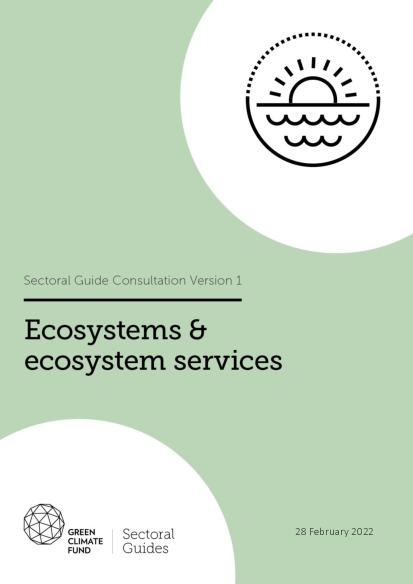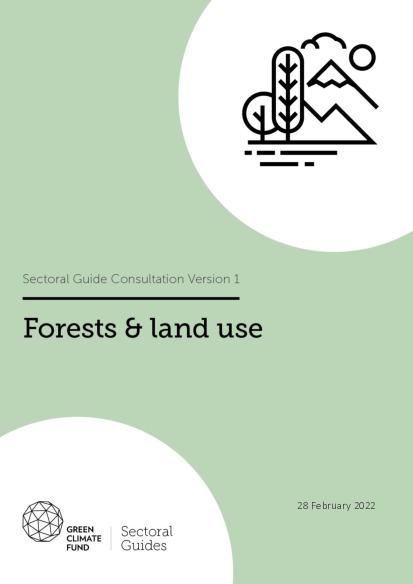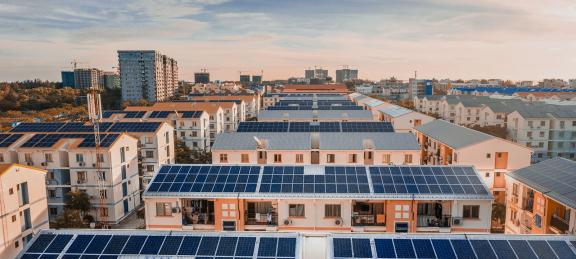Access funding
Overview
The GCF sectoral guides seek to provide an overview and understanding of country needs and of the potential to deliver the greatest impact in support of country priorities. They will also provide information on how targeted GCF investments aligned with country priorities could have the most impact for each sector, driving paradigm shifting pathways and demonstrating strong climate impact. The sectoral guides are intended to be made available as consultation version 1 and are expected to be continuously improved and updated as comments are received, new knowledge developed, and experiences gained. Based on stakeholders’ feedback, more comprehensive guidelines that will apply for all types of GCF projects and programmes will be developed as part of the full sectoral guides while keeping pace with GCF’s replenishment period.
The objective of the guides is to provide a set of ‘how to’ tools to National Designated Authorities, Accredited Entities, and other stakeholders to support the development of high quality and impactful funding proposals for consideration by the GCF Board.
Background
The Board, in decision B.17/08, requested the Secretariat to undertake additional analysis to identify specific results areas, where targeted GCF investments would have the most impact. This work was included in the Secretariat work programmes since 2018, which asked the Secretariat to advance the development of sectoral guides. The Updated Strategic Plan (USP) of the GCF notes that the GCF will issue sectoral guidance for the GCF eight results areas and in cooperation with its partners, the GCF will use lessons from programming and implementation to improve capability and project outcomes.
As part of this mandate and in line with its work programme and the USP, the Secretariat has been working on the development of ten sectoral guides across GCF’s eight results areas. The sectoral guides are a set of practical tools, which aim to guide project development and appraisal. The GCF will complete sectoral guidance and present them to the Board for its consideration as noted in the USP.

Sectoral guides' summaries
02 Dec 2022
This document provides a summary of the ten GCF sectoral guides. Each guide covers one of the sectors in which GCF operates in detail, outlining the global context for that sector, two to four paradigm shifting pathways that have potential for greatest impact, information on how these pathways can be financed, examples of cases that illustrate the potential in the sector, and the GCF investment criteria.
Sectoral guides

Sectoral guide: Health & wellbeing
22 Sep 2022
For a transformation towards climate adaptive, low emissions health systems, GCF had identified the following two paradigm shifting pathways for advancing the highest climate impact projects and programmes and supporting country needs: (1) Promoting climate-resilient, nature-positive health systems and services and (2) Facilitating climate-informed advisory and risk management services and community action. Key to GCF’s role in scaling up finance is mobilizing international private and public funding to systematically address barriers and reduce investment risks.

Sectoral guide: Climate information & early warning systems
22 Sep 2022
Paradigm shift can be achieved through adaptation and mitigation approaches that invest systematically in the value chain of CIS, MHEWS and early action capacity. Three distinct paradigm-shifting pathways can deliver significant and paradigm shifting impact: (1) strengthening climate information services, (2) promoting impact-based MHEWS and early action, and (3) improving Climate Information and Early Warning Systems (CIEWS) for investment and financial decisions.GCF is uniquely placed to unlock the barriers to the CIEWS market in developing countries by supporting governments to de-risk the environment and provide the incentives to crowd in private sector investments.

Sectoral guide: Energy efficiency
22 Sep 2022
Given the need to significantly reduce greenhouse gas (GHG) emissions during this decade to meet the Paris Agreement goals, GCF has identified the following three energy efficiency (EE) paradigm shifting pathways for advancing the highest climate impact projects and supporting country needs: (1) Scaling-up industrial energy efficiency, (2) Enhancing “space” energy efficiency, and (3) Catalysing rapid market switch to highest efficiency appliances/equipment. GCF is a fundamentally partnership-based institution, thus leveraging existing sectoral initiatives, coalitions, and platforms remains critical to creating multiplier effects and to promoting joint learning and knowledge transfer.

Sectoral guide: Water security
22 Aug 2022
The vision for a paradigm-shift in water security is to secure water resilience and water services under conditions of increased climate change impacts. In the cross-referencing the targets of UN-SDG6 with UN-SDG13 they indicate that water security, induced by water scarcity supports fast-tracking climate investment into transformational water projects as a new asset class and integrated grey-green infrastructure under blue finance in two inter-linked paradigm-shifting pathways: (1) enhancing water conservation, water efficiency and water re-use, and (2) strengthen integrated water resources management – protection from water-related disasters, preserve water resources and enhanced resilient water supply and sanitation services.

Sectoral guide: Low emission transport
22 Aug 2022
Research-based evidence, best practices, and lessons learned indicate that the highest impact for a paradigm shift in the low emissions transport sectoral guide can be achieved through three interlinked pathways: (1) accelerating shift to low emission public transport, (2) rapidly electrifying transport systems, and (3) supporting scale up of new generation zero emission fuels. To meet the capital needs of the three pathways, alignment between long term strategic transport planning as well as land, energy, and financial planning, which integrate climate and development goals, is essential.

Sectoral guide: Energy access and power generation
06 May 2022
Three distinct paradigm-shifting pathways can deliver significant paradigm shift in the Energy access and power generation sector: (1) low emission power generation, efficient, reliable energy transmission, distribution, and storage, (2) efficient, reliable energy transmission, distribution, and storage, (3) promoting access to modern renewable energy. GCF aims to leverage its range of financial instruments to de-risk renewable energy investments, reduce the cost of financing and thus the expected rate of return required by investors to improve affordability to end-users and accelerate the transition to renewable energy technologies.

Sectoral guide: Ecosystems and ecosystem services
28 Feb 2022
The vision for a GCF paradigm-shift in ecosystems is to secure their resilience, functionality, and the maintenance of ecosystem services under conditions of climate change. This can be achieved through large-scale protection, restoration, and adaptive management along two paradigm shifting investment pathways: (1) ecosystem-based management of terrestrial and freshwater ecosystems and (2) ecosystem-based coastal and marine zone management. Enabling actions across both pathways aim to protect, enhance, and ensure connectivity of the major ecosystem types and biomes.

Sectoral guide: Forests and land use
28 Feb 2022
The vision for a paradigm shift is centered around reducing emissions from forest loss and degradation; addressing the drivers of deforestation, notably in agriculture – and more broadly, implementing a cross-sectoral, landscape approach to reducing deforestation and forest degradation; increasing resilience of local people and forests against climate change through protecting and restoring natural and managed forest ecosystems and landscapes; focusing on the needs of the most vulnerable; and improving the livelihood of communities and forest-dependent people. This can be achieved along three paradigm shifting investment pathways: (1) protecting natural forests and landscapes, (2) restoring degraded forests and other landscapes, and (3) sustainable management of productive forest landscapes.

Sectoral guide: Agriculture and food security
10 Sep 2021
Transformation towards climate resilient and low emission agriculture can be achieved through three interlinked paradigm-shifting pathways and enabling environment supporting them. These are: (1) Promoting resilient agriculture; (2) Facilitating climate informed advisory and risk management services; and (3) Reconfiguring food systems. In the context of a changing climate and loss of biological diversity, increasing the quantity and quality of food production, while reducing its carbon footprint, requires adaptation and mitigation efforts across these paradigm shifting pathways.

Sectoral guide: Cities, buildings and urban systems
10 Sep 2021
Comparative research has yielded a set of four paradigm-shifting pathways in both mega/large and secondary cities, which have strong potential to deliver high-impact, cost-effective climate benefits at scale, with local benefits. These are (1) decarbonization of urban energy systems, (2) energy efficiency in building stock, (3) compact and resilient urban development, and (4) circular urban economy. The GCF is well placed to support developing countries raise and realize their climate ambition in the urban sector through country-driven approach.

Annex to GCF sectoral guides: Climate-resilient infrastructure
31 Aug 2023
In an era marked by rapid climate change, our focus on infrastructure requires a paradigm shift. Infrastructure systems globally, from transportation to water supply, from urban planning to energy grids, must not only serve their functional purposes but must also be resilient against the uncertainties of climate change. This resilience ensures the security, health, and prosperity of communities worldwide.
Webinars

Introductory webinar on the draft GCF Sectoral Guide: Climate Information & Early Warning Systems
June 2022
In connection with the GCF Sectoral Guides Consultation launched on 6 May 2022, this webinar will present the draft GCF Sectoral Guide on Climate Information & Early Warning Systems Draft and include a Q&A session. The GCF Sectoral Guide on Climate Information & Early Warning Systems provides an overview of country needs and evidence-based programming experiences in the relevant sector. It also aims to identify opportunities for high impact, paradigm-shifting investments in each...

Introductory webinar on the draft GCF Sectoral Guide: Energy Efficiency
June 2022
In connection with the GCF Sectoral Guides Consultation launched on 6 May 2022, this webinar will present the draft GCF Sectoral Guide on Energy Efficiency Draft and include a Q&A session. The GCF Sectoral Guide on Energy Efficiency provides an overview of country needs and evidence-based programming experiences in the relevant sector. It also aims to identify opportunities for high impact, paradigm-shifting investments in each sector to guide proposal development for the GCF in line with...

Introductory webinar on the draft GCF Sectoral Guide: Water Security
December 2021
In connection with the GCF Sectoral Guides Consultation launched on 15 November 2021, this webinar will present the draft GCF Sectoral Guide on Water Security Draft and include a Q&A session. The GCF Sectoral Guide on Water Security provides an overview of country needs and evidence-based programming experiences in the relevant sector. It also aims to identify opportunities for high impact, paradigm-shifting investments in each sector to guide proposal development for the GCF in line with...

Introductory webinar on the draft GCF Sectoral Guide: Health & Well-being
December 2021
In connection with the GCF Sectoral Guides Consultation launched on 15 November 2021, this webinar will present the draft GCF Sectoral Guide on Health & Well-being Draft and include a Q&A session. The GCF Sectoral Guide on Health & Well-being provides an overview of country needs and evidence-based programming experiences in the relevant sector. It also aims to identify opportunities for high impact, paradigm-shifting investments in each sector to guide proposal development for the...

Introductory webinar on the draft GCF Sectoral Guide: Low Emission Transport
December 2021
In connection with the GCF Sectoral Guides Consultation launched on 15 November 2021, this webinar will present the draft GCF Sectoral Guide on Low Emission Transport Draft and include a Q&A session. The GCF Sectoral Guide on Low Emission Transport provides an overview of country needs and evidence-based programming experiences in the relevant sector. It also aims to identify opportunities for high impact, paradigm-shifting investments in each sector to guide proposal development for the...

Introductory webinar on the draft GCF Sectoral Guide: Energy Generation & Access
April 2021
In connection with the Draft GCF Sectoral Guides Consultation launched on 30 March 2021 to 30 June 2021, this webinar will present the draft GCF Sectoral Guide on Energy Generation & Access, followed by a Q&A session. The Draft GCF Sectoral Guide on Energy Generation & Access provides an overview of country needs and evidence-based programming experiences in the relevant sector. It also aims to identify opportunities for high impact, paradigm-shifting investments in each sector to...

Introductory webinar on the draft GCF Sectoral Guide: Forests & Land Use
April 2021
In connection with the Draft GCF Sectoral Guides Consultation launched on 30 March 2021 to 30 June 2021, this webinar will present the draft GCF Sectoral Guide on Forests & Land Use, followed by a Q&A session. The Draft GCF Sectoral Guide on Forests & Land Use provides an overview of country needs and evidence-based programming experiences in the relevant sector. It also aims to identify opportunities for high impact, paradigm-shifting investments in each sector to guide proposal...

Introductory webinar on the draft GCF Sectoral Guide: Ecosystem & Ecosystem Services
April 2021
In connection with the Draft GCF Sectoral Guides Consultation launched on 30 March 2021 to 30 June 2021, this webinar will present the draft GCF Sectoral Guide on Ecosystem & Ecosystem Services, followed by a Q&A session. The Draft GCF Sectoral Guide on Ecosystem & Ecosystem Services provides an overview of country needs and evidence-based programming experiences in the relevant sector. It also aims to identify opportunities for high impact, paradigm-shifting investments in each...

Workshop on the draft of the Water Sector Guidelines for DAEs
April 2021
Water is the primary medium through which climate change impacts the livelihoods and well-being of societies. Since 2015, GCF has appraised and financed a wide range of water projects spanning the full breadth of the water sector, with projects in water resources management, water supply, sanitation, urban drainage, irrigation, hydropower, flood control, drought management and coastal zone management. There is a substantial demand from developing countries for projects in the water sector, but...

Introductory webinar on the GCF Sectoral Guide: Agriculture and Food Security
November 2020
In connection with the GCF Sectoral Guides Consultation launched on 9 November 2020, this webinar will present the draft GCF Sectoral Guide on Agriculture and Food Security and include a Q&A session. The GCF Sectoral Guide on Agriculture and Food Security provides an overview of country needs and evidence-based programming experiences in the relevant sector. It also aims to identify opportunities for high impact, paradigm-shifting investments in each sector to guide proposal development for...

Introductory webinar on the GCF Sectoral Guide: Cities, Buildings and Urban Systems
November 2020
In connection with the GCF Sectoral Guides Consultation launched on 9 November 2020, this webinar will present the draft GCF Sectoral Guide on Cities, Buildings and Urban Systems and include a Q&A session. The GCF Sectoral Guide on Cities, Buildings and Urban Systems provides an overview of country needs and evidence-based programming experiences in the relevant sector. It also aims to identify opportunities for high impact, paradigm-shifting investments in each sector to guide proposal...